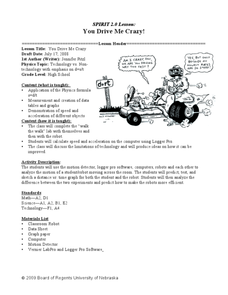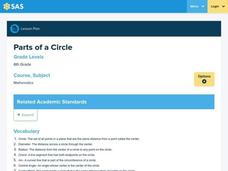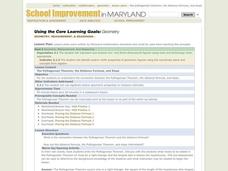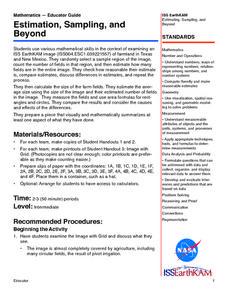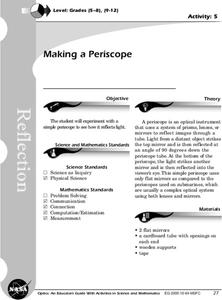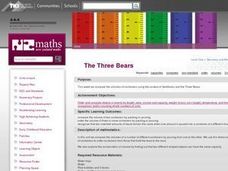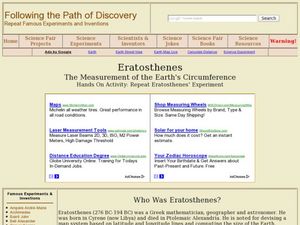Curated OER
An Introductions to Congruent Polygons
Pupils differentiate between similar and congruent polygons. In this geometry lesson, students define the theorems and reasons for polygons similarity and congruence. They are given pictures and patterns to differentiate and identify.
Curated OER
You Drive Me crazy
Pupils calculate the distance and acceleration of an object. For this algebra lesson, students collect data and create table and graphs to analyze it. They complete a lab as they collect and analyze data on acceleration and distance.
Curated OER
Parts of a Circle
Sixth graders use yarn, paper plate, and other materials to identify parts of a circle. In this parts of a circle lesson plan, 6th graders identify the circumference, radius, diameter, and other parts of a circle.
Curated OER
Trains
Pupils compare the lengths of the train through calculation. This calculation can be done by knowing the values of the rods. Students use problem solving to get the answer to the problem before them.
Curated OER
The Pythagorean Theorem, the Distance Formula, and Slope
Students explore the concept of the Pythagorean Theorem. In this Pythagorean Theorem lesson, students derive the distance formula and slope of a line from the Pythagorean Theorem.
Curated OER
Figure It Out - Polygons
Sixth graders explore different polygons. In this polygon lesson, 6th graders examine a rhombus, quadrilateral, parallelogram, and rectangles. Students compare and contrast polygons and research shapes on the Internet.
Curated OER
Tessellations
Seventh graders investigate geometric shapes using tessellations. In this geometry lesson, 7th graders practice tessellations using different shapes. They create different designs using tessellations.
Curated OER
Structures and Shapes
Students make jewelry using different shapes from magazines, tissue paper, cardboard, and other materials. In this making jewelry lesson plan, students complete this hands on activity to discuss how shapes are used.
Curated OER
Reflection
Eighth graders use a stencil to make a figure with which they discover the horizontal line of reflection, the vertical line of reflection, and the diagaonal line of reflection using coordinates.
Curated OER
Christmas Presents
Seventh graders create a graph of their Christmas gifts. They develop categories, compute fractional and decimal parts for each category, identify the number of degrees to represent each fractional part, and create a circle graph to...
Curated OER
Estimation, Sampling, and Beyond
Students examine an ISS EarthKAM image of farm land in Texas and New Mexico. They select sample region of image and count the number of fields in that region. They estimate how many fields are in the entire region.
Curated OER
Making a Periscope
Students experiment with a simple periscope to see how it reflects light. They draw a diagram of the path a ray of light follows as it travels from an object, through the periscope, and into your eye.
Curated OER
The Three Bears: Comparing and Ordering
Students explore comparing and ordering volume of containers. They use the context of Goldilocks and the Three Bears to compare the volume of various containers by packing or pouring.
Curated OER
Data-gathering Activities Relating to Trees in Their Environment
Students gather data relating to trees in their environment. In this biology lesson plan, students determine heights of trees and their ages. A canopy map will indicate optimal growing areas for the tree.
Curated OER
Area of irregular Polygons: Historical Motivator - Lewis and Clark Adventure
Seventh graders find the area of irregular polygons. In this lesson on calculating area, 7th graders use the adventures of Lewis and Clark as motivation to learn how to calculate the area of irregular polygons.
Curated OER
Graph Both Crusts
Fourth graders calculate the angles and construct a pie graph of the percentages of the elements in the continental and oceanic crusts. Then they analyze the results. They can be assigned the task of researching the percentages.
Curated OER
Unit Perimeters and Areas
Students use Geometers SketchPad to find the area and perimeter of several shapes. In this geometry lesson, students determine area of rectangles and progress through irregular polygons. None of the referenced worksheets are included...
Curated OER
Reflections
Fourth graders become familiar with the use of the Geometer's Sketchpad. They examine and practice creating geometric shapes. Students identify shapes and explore the introductory functions of the Geometer's Sketchpad. They complete...
Curated OER
Motion in Two Dimensions
Two activities employ the use of kinematic equations for determining projectile ranges. They both require the use of a toy dart gun. Included in this resource are both the teacher's guide and student laboratory sheets. This is an...
Curated OER
Eratosthenes
Students examine what Eratosthenes is and the history behind him. In this earth lesson students complete a hands on activity to repeat Eratosthenes' experiment.
Curated OER
Paper Packaging Design
Learners discuss the relationship between technology and manufacturing. They then use their ideas to construct a model of a paper board carton package. Next they view a PowerPoint presentation to learn about the history of packaging...
Curated OER
The Colors on My TV Screen
Students explore how electronic screens use only three colors to produce the colors that people see on the screen. They make and test a color wheel.
Curated OER
Capturing the Wind
Learners collect and analyze data about wind speed. They build a Lego wind sail and measure the wind speed with a rotation sensor. They use software to analyze the data.
Curated OER
Properties of Fractals
Students build a working definition of regular fractal, look carefully at the concepts of dimension and scale, and are introduced to logarithms. They solve simple exponential equations for the exponent both by trial and error and using...

